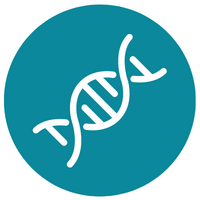
A guide for parents about the causes of eating disorders
Eating disorders are complex and multi-faceted. And to make things even more confusing, every eating disorder is unique to the person who has it. It’s impossible to lock down one single cause of an eating disorder.
Eating disorders are”biopsychosocial,” which means they are caused by an interaction between biology, psychology, and social factors. In the past, parents were often blamed for eating disorders and shut out of the treatment process. This is a tragedy, since parents don’t cause eating disorders and skillful parental involvement improves treatment outcomes.
Skillful support begins with understanding what’s going on and why the eating disorder showed up. Obviously, you can’t change what caused the eating disorder, but when you understand what’s going on, you’re a powerful recovery ally.
Parent-Friendly ❤️ Neurobiology ❤️ Attachment ❤️ Non-Diet ❤️ Health At Every Size®
Eating disorders are caused by an interaction of biology, psychology, and social factors. For example, your child may have inherited a biological predisposition for an eating disorder. Their psychology may include anxiety or depression. And unfortunately, we live in a society that fuels eating disorders by perpetuating weight stigma and diet culture. There is no single factor that causes an eating disorder, but understanding the many possible causes will help you identify which types of support and treatment will be most effective.
Biological Causes of Eating Disorders
There are biological, genetic foundations that set the stage for an eating disorder. Understanding these biological causes of an eating disorder is essential so that parents don’t misunderstand an eating disorder as a “choice” their child is making, but rather the only solution the child can come up with right now. With a parent to guide them, kids can and do find ways to cope with their biology without using eating disorder behaviors.
Genes

There are numerous genes that researchers have identified as common among people who develop mental disorders. This likely explains why eating disorders often show up alongside other disorders like anxiety, depression, substance abuse, etc. Recently scientists have identified some differences in the frontal cortex and subcortical structures of the brains of people with eating disorders. Additionally, they’ve found several brain areas, brain networks, and biological processes that interact with things like the ability to sense hunger and fullness and the ability to control behavior and emotional responses.
Epigenetics

Epigenetics is a sort of code that triggers genetic activity. A person may have the genes that underlie mental disorders. But researchers agree that genes alone don’t cause mental disorders and they may never become an issue without epigenetic activation. Epigenetic triggers come from environmental conditions beginning in utero. There is some evidence they can pass through multiple generations in a family. Epigenetics can be shaped by trauma, including abuse and neglect (physical and emotional). There is a strong correlation between childhood trauma and eating disorders.
Neural Pathways

Neuroception is the body-based sensation of being either safe or unsafe. It is an inborn trait that occurs on a spectrum of sensitivity. It is also influenced by early childhood experiences, especially the security of parental attachment. Neural circuits in the body distinguish safety or threat and cue the body to respond physically, emotionally, and cognitively. The body responds to perceived threats with a state of flight, fight, or freeze (shutdown). A person who has an eating disorder often has highly sensitive neural wiring. Thus, they are often in a state of high agitation or shutdown and struggle with emotional regulation. It is physically very hard to eat normally and digest food when dysregulated.
Psychological Causes of Eating Disorders
There are psychological reasons kids develop eating disorders. We often see eating disorders alongside other conditions like autism and ADHD, for which we have many treatment options to support your child in feeling better and recovering from their eating disorder with their unique neurobiology. Additionally, obsessive compulsive disorder (OCD), anxiety, depression, body dysmorphia, self-harm, and other mental disorders are all treatable mental disorders for which we have extensive treatment options. Parents can help their kids recover from an eating disorder by understanding the psychological causes and providing support for the various mental health conditions that impact it.
Psychology

Our unique psychology is how we mentally adapt to and cope with our biology, social, and environmental conditions. Psychology is a cause of eating disorders. At the same time, repeatedly using eating disorder behaviors creates new psychological mechanisms that reinforce the eating disorder. This is why they tend to be very sticky. A person with an eating disorder may have the following common psychological symptoms: unusually reactive to emotions, avoiding things that make them uncomfortable, low self-worth, negative body image, perfectionism, and obsessive and compulsive tendencies.
Mental Disorders

Eating disorders are often part of a larger ecosystem. For example, people with autism and ADHD are more likely to develop eating disorders. Other disorders that commonly show up with eating disorders are anxiety, depression, post traumatic stress disorder, dissociation, suicidality, self-harm, substance use disorder, borderline personality disorder, and obsessive compulsive disorder. These may be diagnosed before, as a symptom of, or alongside an eating disorder. Having co-occurring mental disorders makes treatment more complicated, since they are usually entangled with each other. A holistic treatment approach, while hard to find, is best.
Beliefs

Eating disorders are built upon and reinforce a person’s belief system. All of us have beliefs that drive our behavior, often unconsciously. A core belief behind many eating disorders is that a person must do something to be worthy of love. This is as opposed to being worthy of love as they are. A common belief that grows out of this is that being thin is good (i.e. worthy of love) and being fat is bad (i.e. not worthy of love). This harmful belief is unfortunately tirelessly built and reinforced by our society. Sadly, this belief then blossoms into other beliefs like eating carbohydrates is bad, eating fat is bad, etc. As the belief system grows it both supports and is reinforced by the eating disorder.
Reinforcement

Eating disorder symptoms are self-reinforcing. This means that distress causes the behavior in the first place, then it “works,” so the person keeps using it. In an adaptive, healthy example, you feel hungry (distress) so you eat (behavior), and feel better (reinforcement). Thus you have reinforced a pattern of behavior: when I feel hungry, I eat. In eating disorders this same pattern is in play: distress + behavior = reinforcement. The difference is that while the behaviors “work” to reduce distress, they have negative consequences and strengthen the eating disorder. These patterns become habitual and automatic over time.
Social Causes of Eating Disorders
Eating disorders are exquisitely responsive to social conditions. This includes obvious social dangers like weight stigma and diet culture. Parents can counteract and help their kids learn to manage the dangerous social forces that encourage eating disorders. Additionally, eating disorders are sensitive to interpersonal dynamics and stress. Parents can support eating disorder recovery by reducing family stress and guiding their child to build emotional regulation skills.
Parental Attachment

All mammals are born with an emotional attachment to their parent(s). Parental attachment can either be secure or insecure. There are three types of insecure attachment: anxious-ambivalent, avoidant, and disorganized. Parental attachment is shaped in infancy based on a parent’s ability to attune and respond to their child’s emotional needs. Many things can get in the way of a secure parental attachment. Nobody is to blame when parental attachment is insecure. However, an insecure parental attachment has been linked to poor physical and mental health. Luckily, it can be made more secure when parents learn new skills.
Family Dynamics

Family dynamics can either support individual development and health or have a negative impact. Healthy family dynamics are those in which the parents are confident in their parental role, and they intentionally build both belonging and individuation. Less healthy family dynamics typically involve role confusion, boundary issues, and/or insecure relational attachments. Improving family dynamics improves treatment outcomes.
Social Attitudes

Social attitudes have a strong influence on eating disorders. Specifically, there is a direct link between weight stigma, diet culture, and eating disorders. These conditions are pervasive in American culture and both cause and reinforce eating disorder beliefs and behaviors. Parents and family members are often significant contributors to a child’s experience with weight stigma and diet culture. Therefore, understanding and reducing weight stigma and diet culture within the home supports eating disorder recovery.
Social Marginalization

Marginalization increases the likelihood of eating disorders. For example, people who experience weight stigma, racism, sexism, homophobia and transphobia are at higher risk of developing eating disorders. While anyone can get an eating disorder, they are found at higher rates in people who have marginalized identities (e.g. female, high weight, queer, trans, etc.). In addition to marginalization causing eating disorders, it also leads to missed diagnoses and under-treatment. For example, eating disorders are less likely to be diagnosed and treated in people at the higher end of the BMI scale and people of color.
Social Support Structures

Our society places tremendous pressure on families to raise healthy children without providing the social and structural support necessary to do so. Parents are grossly under-resourced when it comes to raising healthy children. Genes are involved in mental health disorders, but they have not changed in the last 100 years. Meanwhile, social support has dramatically decreased. Humans are social animals, and a lack of social support is devastating both mentally and physically. Higher rates of mental disorders can be seen as a societal failure to support families and healthy child development.
Parent Scripts For Eating Disorder Recovery
Use these scripts:
- At the dinner table when behavior is getting out of control
- When you need to set boundaries – fast!
- After something happened so you can calmly review the triggers and events
Go to eating disorder symptoms >
Popular Articles About Causes of Eating Disorders
free cheat sheet: Parenting A Child With An Eating Disorder
⭐ Get ready for recovery and find out how you can prepare yourself for maximum success.
⭐ Find out the essential steps and family rules you need to have in place for recovery.
⭐ Make your home recovery-ready with six simple steps that anyone can do.















